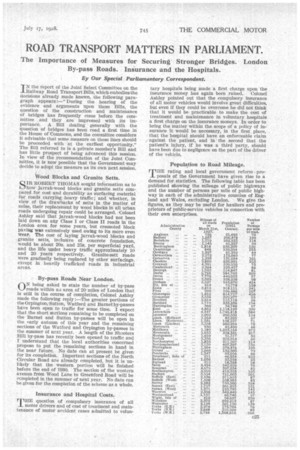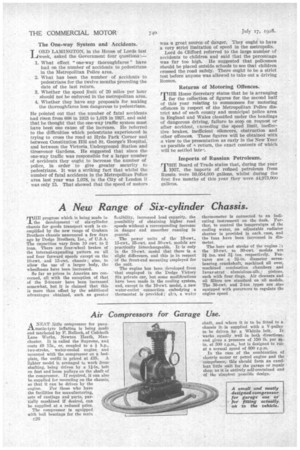ROAD TRANSPORT MATTERS IN PARLIAMENT.
Page 47

Page 48

If you've noticed an error in this article please click here to report it so we can fix it.
The Importance of Measures for Securing Stronger Bridges. London By-pass Roads. Insurance and the Hospitals.
By Our Special Parliamentary Correspondent.
IN the report of the Joint Select Committee on the Railway Road Transport Bills, which embodies the decisions already made known, -the following pantgraph appears :-" During the hearing of the evidence and arguments upon these Bills, the question of the construction and maintenance of bridges has frequently come before the committee and they are impressed with its importance. A Bill dealing generally with the question of bridges has been read. a first time in the House of Commons, and the committee considers it advisable that some measure on these lines should be proceeded with• at the earliest opportunity." The Bill referred to is a private member's Bill and has little prospect of being advanced this session. In view of the recommendation of the Joint Committee, it is now possible that the Government 'may decide to adopt the measure as its own next session.
Wood Blocks and Granite Setts.
SIR ROBERT THOMAS sought information as to how jarrah-wood blocks and granite setts compared for cost and durability as surfacing material for roads carrying -heavy traffic; and whether, in view of the drawbacks of setts In the matter, of noise, their replacement by wood blocks in all urban roads undergoing repair could be arranged. Colonel Ashley said that jarrah-wood blocks had not been laid down on any Class I or Class II roads in the London area for some years, but creosoted block paving was extensively used owing to its more even wear. The cost of laying jarrah-wood blocks and granite setts, inclusive of concrete foundation, would be about 20s. and 25s, per superficial yard, and the life under heavy traffic approximately 10 and 20 years respectively. Granite-sett roads were gradually being replaced by other surfacings, except in heavily trafficked roads in industrial areas.
By-pass Roads Near London.
ON being asked to state the number of by-pass roads within au area_ of 20 miles of London that is still in the course of completion, Colonel Ashley made the following reply :-The greater portions of the Orpington;-Sutton, Watford and Barnet by-passes have been open to traffic for some time. I expect that the short sections remaining to be completed on the Barnet and Sutton by-passes will be open in the early autumn of this year and the remaining sections of the Watford and Orpington by-passes in the summer of next year. A length of the Shooters Hill by-pass has recently been opened to traffic and understand that the local authorities concerned propose to put the remaining sections in hand in the near future. No date can at present be given for its completion. Important sections of the North Circular Road are already completed, hut it is -unlikely that the western portion will be finished before the end of 1930. The section of, the western avenue from Wood Lane to Greenford Road will be completed in the summer of next year. No date can be given for the completion of the scheme as a whole.
Insurance and Hospital Costs.
THE question of compulsory insurance of all motor drivers and of cost of treatthent and maintenance of motor accident cases admitted to volun
tary hospitals being made a first charge upon the insurance money has again been raised. Colonel Ashley pointed out that the compulsory insurance of all motor vehicles would involve great difficulties, but even if they could be overcome he did not think that it would be practicable to make the cost of treatment and maintenance in voluntary hospitals a first charge on the insurance moneys. In order to bring the matter within the scope of a policy of insurance it would be necessary, in the first place, that the hospital should have an enforceable claim against the patient, and in the second that the patient's injury, if he was a third party, should have been due to negligence on the part of the driver of the vehicle.
Population to Road Mileage.
9-1HE rating and local government reform pro
posals of the Government have given rise to a demand for statistics. The following table has been published showing the mileage of public highways and the number of persons per mile of public highway in each of the administrative counties of England and Wales, excluding London. We give the figures, as they may be useful for hauliers and proprietors of public-service vehicles in connection with their own enterprises.
LThe One-way System and Accidents. ORI) LAMINGTON, in the House of Lords last week, asked the Government four questions :--
1. What effect "one-way thbroughfares " have had on the number of accidents to pedestrians in the Metropolitan Police area.
2. What has been the number of accidents to pedestrians for the twelve months preceding the date of the last return.
3. Whether the speed limit of 20 miles per hour should not be enforced in the metropolitan area.
4. Whether they have any proposals for making the thoroughfares less dangerous to pedestrians.
He pointed out that the number of fatal accidents had risen from 668 in 1923 to 1,078 in 1927, and said that he thought that the one-way traffic system must have been one cause of the increase. He referred to the difficulties which pedestrians experienced in trying to cross the road at Hyde Park Corner and between Constitution Hill and St. George's Hospital, and between the Victoria.Undergrotuid Station and Grosvenor Gardens. He suggested that since the one-way traffic was responsible for a larger number of accidents they ought to increase the number of police, in order to give greater security to pedestrians. It was a striking fact that whilst the number of fatal accidents in the Metropolitan Police area last year was 1,078, in the City of London if was only 15. That showed that the speed of motors was a great source of danger. They ought to have a very strict limitation of speed in the metropolis.
Lord de Clifford referred to the large number of accidents to children and said that the percentage was far too high. He suggested that policemen should be placed outside schools to see that children crossed the road safely. There ought to be a strict test before anyone was allowed to take out a driving licence.
Returns of Motoring Offences.
THE Home Secretary states that he is arranging for the collection of figures for the second half of this year relating to summonses for motoring offences in respect of the Metropolitan Police district and of each county and municipal police area in England and Wales classified under the headings of dangerous driving, failure to stop on request or after accident, cxceeding the speed limit, ineffective brakes, inefficient silencers, obstruction and other offences. These figures will be obtained with a view to the presentation as early in the New Year as porsibIe of I return, the exact contents of which will he settled late'.
Imports of Russian Petroleum.
THE Board of Trade states that, during the year 1927, the imports of refined petroleum from Russia. were 93,054,000 gallons, whilst during the first five months of this year they were 44,073,000 gallons.












































































































